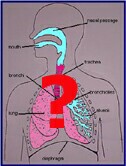
MONDAY, May 24 (HealthDay News) — Medical tradition says that the beta blockers used to treat heart disease shouldn’t be given to people who also have severe lung disease, but a new Dutch study suggests the tradition is wrong.
A study of more than 2,200 people with chronic obstructive pulmonary disease (COPD), a diagnosis that includes emphysema and chronic bronchitis, found better survival among those given beta blockers than those who did not get the drugs, claims a report in the May 24 issue of the Archives of Internal Medicine by physicians at University Medical Center Utrecht.
“To our knowledge, this is the first observational study that shows that long-term treatment with beta blockers may improve survival and reduce the risk of exacerbation of COPD in the broad spectrum of patients with a diagnosis of COPD,” the researchers wrote.
“This is strikingly different from what our medical students are taught today,” said Dr. Don D. Sin, a professor of medicine at the University of British Columbia in Vancouver, Canada, and co-author of an accompanying editorial. “Our traditional teachings are wrong.”
The rap against beta blockers has been that while they improve heart function, they can cause airways to contract, a problem for people with COPD, Sin explained. “They demonstrate in this article that even people with COPD who use beta blockers did very well, better than people who didn’t use beta blockers,” he said.
Fears about beta blockers and COPD date back to the 1980s, when there were reports of “some nasty effects in patients with asthma, especially with high doses,” said study author Dr. Frans H. Rutten, an assistant professor of medicine at Utrecht. The study demonstrates that the drugs can be handled safely for people with COPD, he noted.
“I know of no real problems now, especially when you start with a low dose so that the bronchial airways can adjust to the drug,” Rutten said.
COPD was diagnosed in 560 patients at the start of the study in 1996, and 1,670 developed the condition by the end, in 2006. Of these, 665 were prescribed beta blockers for heart conditions, while 1,565 were not.
During an average follow-up time of 7.2 years, 27.2 percent of the people who took beta blockers died, compared to 32.3 percent of those not given the drug. The incidence of exacerbation — severe flare-up — of COPD was 42.7 percent among beta blocker users and 49.3 percent among nonusers.
The study isn’t the final word on beta blockers and COPD, Sin said. That would have to come from a randomized, controlled study, which almost certainly will never be done, he said.
“If I had a heart attack, I wouldn’t want to be in a clinical trial where there was a 50 percent chance I would get a sugar pill,” Sin said. “So, this study may be the best evidence we get.”
And the incentive of profit from increased use of beta blockers isn’t there to have a drug company fund such a trial, since beta blockers are widely available in inexpensive, generic form, he added.
Sin acknowledged that he has been “an outlier” on the issue, already prescribing beta blockers for people with COPD. “But with this paper, I am much more confident that COPD patients can tolerate beta blockers,” he said.
There are some exceptions, Sin noted. “For people with very bad asthma who have very reactive airways, I am much more cautious,” he said. “I would start with the lowest dose possible, and then titrate upwards.”
More information
To learn more about COPD, visit the U.S. National Heart, Lung, and Blood Institute.

